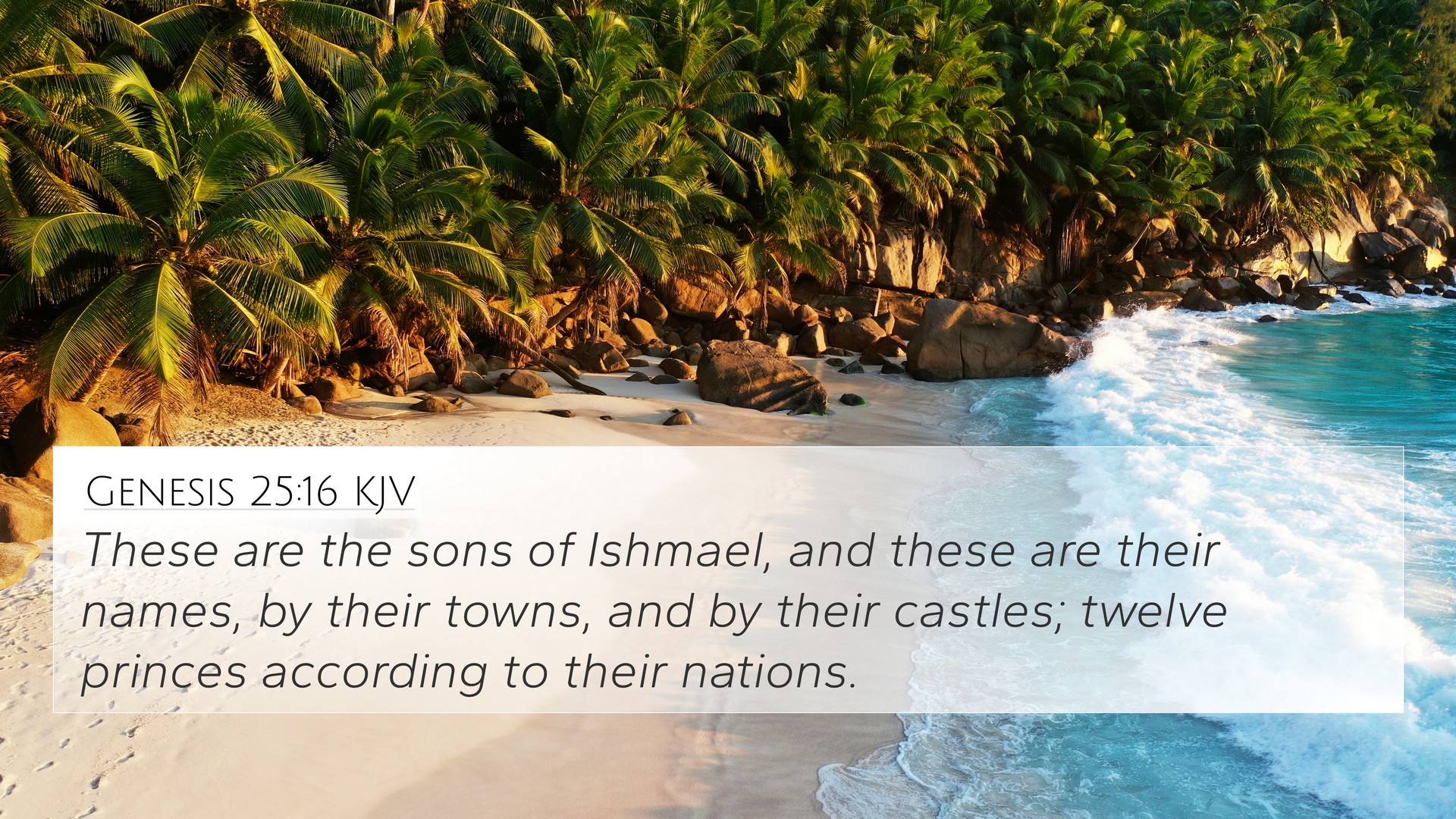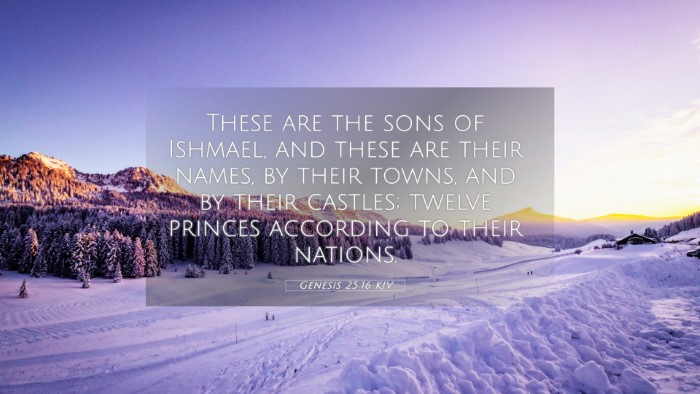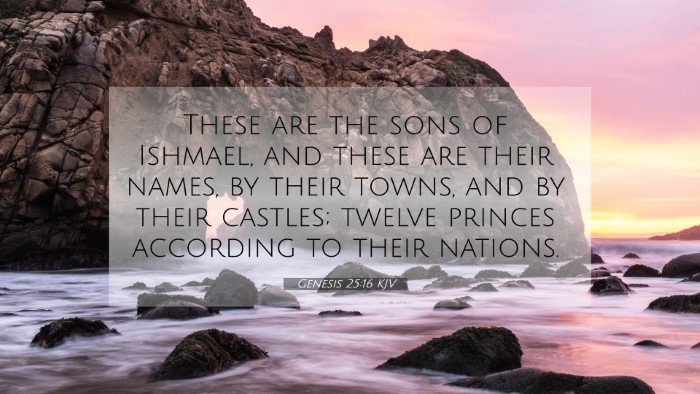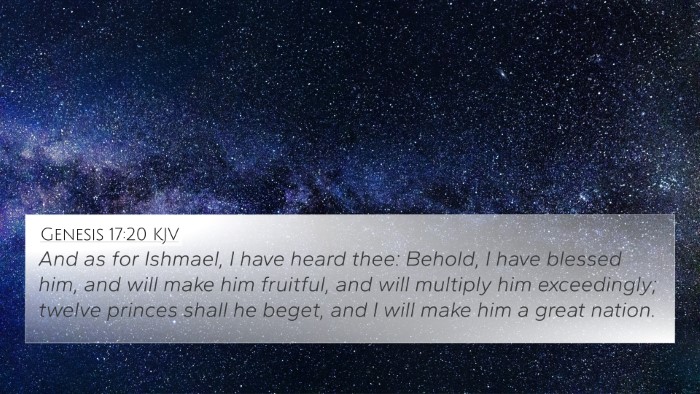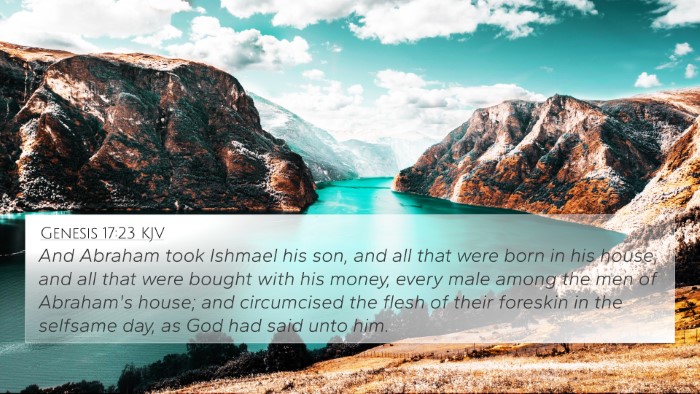Analysis and Interpretation of Genesis 25:16
Bible Verse: Genesis 25:16
Text: "These are the sons of Ishmael, and these are their names, by their towns and by their encampments; twelve princes according to their tribes." (Genesis 25:16 ESV)
Meaning and Insights
The passage in Genesis 25:16 provides a historical account of the descendants of Ishmael, the first son of Abraham. This verse is significant for several reasons:
- Historical Context: Ishmael was born to Abraham and Hagar, Sarah's Egyptian maidservant. This verse marks the fulfillment of God's promise to Hagar that Ishmael would become a great nation (Genesis 21:18).
- Tribal Leadership: The mention of twelve princes implies political leadership among Ishmael's descendants, which would eventually lead to the formation of tribes.
- Cultural Significance: The portrayal of towns and encampments highlights the nomadic lifestyle of Ishmael's descendants and their settlement patterns in the Arabian Peninsula.
Commentary Synthesis
Insights from public domain commentaries enhance understanding of this verse:
- Matthew Henry: He emphasizes God’s faithfulness to His promises, noting that Ishmael, though not the chosen son of promise, still receives significant blessings. This serves as a reminder of God’s grace extending beyond Israel.
- Albert Barnes: Barnes points out that the listing of names and locations serves the purpose of establishing a lineage that connects back to Abraham, illustrating the importance of Abrahamic promises even in the context of Ishmael.
- Adam Clarke: Clarke expands on the cultural implications of the clans and encampments, indicating how these tribes would influence the surrounding nations and connect to later biblical narratives concerning Israel and its neighbors.
Cross-References and Thematic Connections
Understanding Genesis 25:16 involves connecting it to other biblical texts. Here are some related passages that enhance its meaning:
- Genesis 17:20: God promises Abraham that Ishmael will be fruitful and multiply.
- Genesis 21:13: God reassures Abraham about Ishmael's future.
- Genesis 21:17-19: The account of God providing for Hagar and Ishmael in the wilderness.
- Genesis 37:25: A narrative element where Ishmaelites are involved in trading, linking Ishmael's descendants to Israel's story.
- 1 Chronicles 1:29-31: A genealogical record that reinforces Ishmael's significance in biblical history.
- Galatians 4:22-31: An allegorical interpretation of the two sons of Abraham, contrasting Ishmael and Isaac.
- John 8:39: The Jews claim descent from Abraham, highlighting the conversation about lineage that includes Ishmael.
Conclusion
Genesis 25:16, while a brief account of the descendants of Ishmael, opens doors to rich theological insights and cross-references that establish the importance of these figures in biblical history. By employing tools for Bible cross-referencing, such as a Bible concordance or cross-reference guide, scholars and readers can delve deeper into the connections between this verse and various scriptural themes.
Through comparative Bible verse analysis and inter-Biblical dialogues, one can appreciate the broader narrative tapestry that spans both the Old and New Testaments.
Further Study Suggestions
For anyone seeking to explore the themes present in Genesis 25:16, consider the following approaches:
- Using a Bible Cross-Reference System: Identify connections and parallels by examining both the genealogies in Genesis and related New Testament references.
- Cross-Reference Bible Studies: Undertake group discussions focusing on the implications of Ishmael’s lineage in connection to Israel and the mercy shown to all nations.
- Scripture Memorization: Memorize key verses that relate to God's covenant promises to Abraham, including those concerning Ishmael.
Engaging in these methods will enhance your understanding of biblical connections and provide richer insights into how scriptures interrelate.
